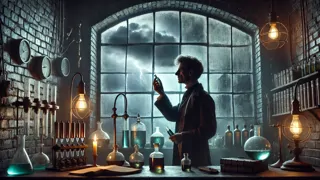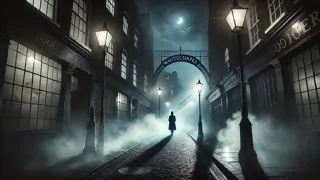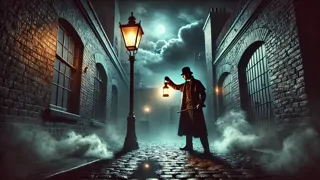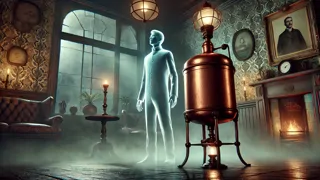Introduction
A single globe of wavering gaslight casts grotesque shadows along the wrought-iron shelves of Dr. Adrian Blackwood’s clandestine laboratory. Every surface under his care is crowded with blinking alchemical contraptions—pressurized retorts that sigh with escaping steam, delicate copper coils wrapped around glass flasks filled with phosphorescent liquids, and ancient leather-bound tomes whose yellowing pages record forbidden theories. Beyond the frosted window, a thunderstorm rages, as if heaven itself revolts at the unnatural experiments within. The air tastes of ozone and decomposition, each breath a reminder of the thin edge between discovery and disaster. Blackwood himself stands at the heart of the tempest, his gaunt face illuminated by a single arc lamp, eyes flickering like a scholar possessed. Only months earlier he had been a respected professor at Oxford, lauded for contributions to optics and physiology. Yet the noble pursuit of knowledge curdled into obsession when he stumbled upon formulae hinting at a miraculous transformation: the ability to vanish from mortal sight. As he drains the final vial in a trembling, deliberate motion, time seems to waver. Footsteps echo somewhere behind him, but the assassin might be within his own conscience. He swirls the serum beneath his tongue, and as the pressurized hiss of outgoing steam crescendos, faint wisps of pale translucence spread over his skin like morning mist upon glass. He watches in awe and horror as the last vestiges of reflection slip away, along with any certainty of what remains inside: man or monster?
The Obsession Takes Hold
The moment Blackwood vanished, the world around him stood still. He raised a trembling hand to his face and found only the faintest suggestion of a cheekbone, a ghostly impression shifting with each breath. A cold thrill coursed through him—a proof of triumph so intoxicating that he nearly slipped from the confines of reality. He beckoned the arc lamp lower, pressing his palm against the glass globe. A ripple of darkness consumed his silhouette until the lamp stood alone, filaments aglow, suspended in perfect solitude. In that instant, the isolation of invisibility revealed both its power and its curse. Unseen, he could eavesdrop on colleagues who once respected him. He pilfered letters from rival academics, unraveling their most personal correspondences, and watched their reputations crumble without ever firing a single shot. Yet each breach of trust gnawed at his conscience, a persistent echo of a man who once believed in integrity. Paragraph after paragraph of scrawled confessions filled his notebooks, chronicling every moral trespass he committed under the cover of nothingness. Slowly, his initial excitement curdled into paranoia. Voices in the night seemed to mock him—could anyone exist in a state of complete obscurity and remain sane? Blackwood found himself chained to the flange of his own invention, experimenting relentlessly in the dead hours to perfect the antidote. But every success only drew him further from redemption, and the difference between scientist and specter grew perilously thin.

To escape the suffocating confines of the laboratory, Blackwood ventured into the alleys off Whitechapel Road. He moved like a phantom through dimly lit courtyards, trailing the scent of damp brick and refuse. The dockworkers and shopkeepers, accustomed to the fog, never suspected that something more sinister haunted their nightly routines. With a trembling hand, Blackwood lifted a lantern’s hood to reveal the empty air above a crate of salted fish; their screams and curses bent on his ears alone, as if the world refused to believe in his presence. Each interaction further stripped away his humanity. He reveled in the shock of a vanished coin purse, the thrill of watching a man’s lifelong savings evaporate into thin air. But at home, in the dark silence of his quarters, he grappled with the new emptiness within: a spectral void of empathy, empathy he feared was irretrievably lost.
His journals became the only refuge for his fractured thoughts. By flickering candlelight he recorded every nuance of the serum’s effect, speculating on ways to bind his inhuman advantage with both scientific precision and a modicum of moral restraint. He tested concentrations until his fingertips bled, forging chemical bonds with ingredients so exotic that not a single peer could replicate them. Hypnotic lines of Latin and Greek entwined with formulas scribbled in a manic scrawl, as though two languages warred within his mind—one pleading for reason, the other demanding unchecked power. And so Blackwood stood at a crossroads with invisible footsteps: emerge once more into visibility, exposing his sins to the world, or continue down the path of specter, forsaking the last fragments of his conscience for an eternity of dominion.
Vanishing Act in Whitechapel
Under the veil of a moonless sky, Blackwood ventured back into the heart of London. Whitechapel’s labyrinth of narrow lanes and crumbling tenements served his purpose perfectly: anonymity was assured when no one could see what they could not believe. He infiltrated a raucous crowd outside a saloon, entwining himself among the ragged coats and whiskey breath. Strangers bumped against him, their jackets brushing over vacant air, their startled glances searching for the culprit who had stolen their balance. He leaned close enough to hear the creak of floorboards beneath the narrow stair to a brothel, and withdrew a stolen purse heavy with coins. A brief glimmer of triumph lit his hidden spirit, but it was swiftly extinguished by a darker curiosity: what lives could he upend before the dawn?

On the night that would become legend, a merchant balked at a vanished shipment of silk from his packed cart, raising calls of witchcraft in the street. Hissing whispers traveled from tobacconists to fishmongers until the rumor of a ghostly thief spread through the borough like wildfire. Inspector Elias Rawlings, a stoic man of lean build and keen mind, arrived with official writ in hand. He stepped beneath a flickering lamp, took careful measure of the scattered footprints—one set ending abruptly, as though its owner had been lifted from earth—and noted a faint smudge of silken blue upon the rough stone. Rawlings bent to examine the thread, jaw clenched with determination. A hush fell over the onlookers, punctuated only by the distant toll of Big Ben challenging the hour. He could not yet fathom the extent of the forces he pursued—his casebook contained no precedent for a criminal who cast no shadow.
Blackwood watched from the mouth of a deserted passage, heart hammering against ribs that felt suddenly too small for so vast a secret. He studied the inspector’s methodical gait, every measured step betraying a will of iron. In that moment, Blackwood sensed a rival intellect across the twilight boundary—someone who might unravel his invisible advantage not by uncanny power, but by sheer deduction alone. The thought sent a ripple of panic through him. He retreated into the labyrinth, leaving the police to chase empty air, but carried Rawlings’s disciplined gaze in his mind. His creation was no mere trick; it was a weapon that would cut him from humanity itself, and now a hunter with a brilliant mind threatened to wrest control of the narrative.
That encounter cemented Blackwood’s fear: invisibility was not the true invention, but the madness fastened to its coat-tails. He pressed forward through Whitechapel’s winding alleys, trailing the inspector’s path in reverse, calibrating each footstep with near obsession. By dawn’s gray light, Blackwood resolved that his ultimate experiment must be fought on intellectual terrain broader than any street. He would lure Rawlings into the very lair of his making—but first, he would perfect the serum’s formula to cloak not only his body but his conscience, leaving no trace of the man beneath the mist.
The Moral Abyss
In the days that followed, Blackwood’s journal entries grew ever darker in tone. Once he had viewed invisibility as triumph, but now it had become a mirror exposing his worst impulses. He explored the city’s grandest estates from within closed walls, overheard whispered confessions and family secrets that poisoned bloodlines and fettered fortunes. With each revelation he grew more convinced that the moral codes of society were little more than fragile illusions. All he had to do was tear them away to reveal the raw human core. Yet as he sifted through those private fissures, he sensed an echo from his former self: a small voice that still recognized the inherent horror in his feats.

Inspector Rawlings, meanwhile, refused to believe in supernatural theft. He traced supply chains, interviewed dockworkers, and compiled a web of physical evidence no unseen force could alter. Each lead brought him closer to the truth: only a scientist of great genius and equal madness could have conceived such a crime. Rawlings’s inquiries next pointed toward the old abandoned windmill outside town, a rumored haunt for clandestine experiments. Blackwood understood the inspector’s logic but relished the irony: Rawlings would find nothing but an empty shell. On a rain-slick night, the inspector arrived at the windmill, lantern raised high. He circled the base, noticed footprints half-erased by wind and rain, and lifted a scrap of Blackwood’s discarded lab coat. In that fragment of cloth, Rawlings read the confession of horror and genius intertwined, a revelation bound to shatter both hunter and hunted.
Convinced he must conclude this cat-and-mouse chase by poisoning Rawlings’s certainties, Blackwood orchestrated a final meeting within his own sanctum. He masked the front door with the scent of burning pitch and lined windows with lead plates so that even the keenest eye found nothing amiss. As Rawlings stepped into the silent chamber, resolved to bring a madman to justice, Blackwood stood invisible at his side. A low chuckle resonated through the empty hall, ricocheting off stone walls. The inspector spun, lantern beam slicing through darkness to reveal empty air. Then the specter spoke in Blackwood’s trembling voice—a voice now distant and uncanny. “Your mind is a great instrument, inspector,” it whispered. “But can it grasp what lies beyond mere flesh and bone?” In that moment, the final confrontation of intellect and insanity began, each combatant ready to sacrifice everything for control of the ultimate secret.


















